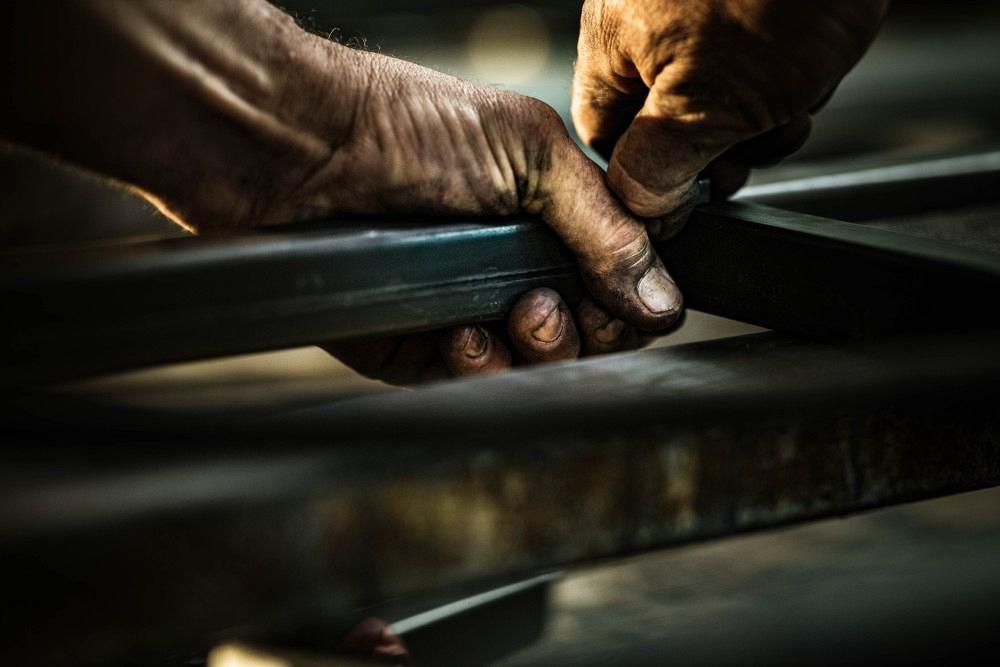- FMA
- The Fabricator
- FABTECH
- Canadian Metalworking
Categories
- Additive Manufacturing
- Aluminum Welding
- Arc Welding
- Assembly and Joining
- Automation and Robotics
- Bending and Forming
- Consumables
- Cutting and Weld Prep
- Electric Vehicles
- En Español
- Finishing
- Hydroforming
- Laser Cutting
- Laser Welding
- Machining
- Manufacturing Software
- Materials Handling
- Metals/Materials
- Oxyfuel Cutting
- Plasma Cutting
- Power Tools
- Punching and Other Holemaking
- Roll Forming
- Safety
- Sawing
- Shearing
- Shop Management
- Testing and Measuring
- Tube and Pipe Fabrication
- Tube and Pipe Production
- Waterjet Cutting
Industry Directory
Webcasts
Podcasts
FAB 40
Advertise
Subscribe
Account Login
Search
Getting back to my roots and dirty hands on the metal fab shop floor
Worker turnover forces Nick Martin to spend less time behind an office computer and more time behind a machine
- By Nick Martin
- July 24, 2021

When North Carolina job shop Barnes MetalCrafters recently experienced some sudden worker turnover, manager Nick Martin went from spending 10% of his week on the shop floor to 90%. He writes how he enjoyed getting back to his metal fabrication roots and dirtyhands. Getty Images
Sometimes you have to go back to your roots and find some of the spark that got you going in the first place. I often reminisce about the early days of my metal fabrication career: pushing a broom, shop talk with co-workers, and solving problems with equipment. Looking back, I learned a lot. A whole lot. And taking that knowledge and helping others grow is what makes this industry great. Contagious, even.
Over the years I have done a lot of jobs in the shop and run different types of equipment: rollers, hand brakes, press brakes, mag brakes, ironworkers, production saws, shears, plasma tables, laser, welders, hand tools. That may sound like a lot to someone unfamiliar with a metal fabrication shop, but a large combination of any of those tools could be run throughout a normal day by just one person. It’s just part of the flow and how you get things made and done.
In college, I studied computer information systems in the business school at Appalachian State University, so a lot of my professional background was in front of a computer. I’ve mentioned before that I found a love for 3D modeling. And that’s ultimately the direction I took my career in the shop. I was able to connect to everything that was going on in the shop with the drawings and models I was making.
For several years, though, I was often running the laser while I was modeling parts and programming them. This wasn’t an ideal situation for me or anyone at the shop. We found people to help run the machine and take a lot of pressure off me. Fast forward several more years, we now have two lasers that we try to keep running as much as possible. With the right crew, you can move a lot of parts through the shop using those two machines.
So when a couple employees, at the same exact time, said they were leaving the shop to go work with family members, it was a definite thorn in our side. But as my co-worker and shop lead Nick Trueheart said, “The show must go on, and this shop ain’t going anywhere.” My dad and MetalCrafters owner, Tim, put the hiring engines on all cylinders. Within a couple of days, we had a few interviews.
We hired a couple of guys who were extremely motivated to work with us and learn anything we could throw at them. I was really impressed with their attitudes. One guy was able to start immediately. The other would start the following week. Luckily, we had our two departing employees for another week to do some crash course training. While this was taking place, our management had several discussions about how we were going to handle this situation for the next several weeks, possibly months.
The conclusion was that I was going to have to venture back into the shop and grease my wheels again. The 70% to 80% of my workweek spent in the office was quickly going to be 5% to 10%. I was OK with that and ready to get back to my roots. I miss being in the shop all the time. It makes the day go by faster and it’s fun.
Our new hire got some good training and I was able to look over his shoulder while I refreshed myself with our lasers. I wanted the new guy to get as much hands-on experience as possible. I knew I was going to be right in the mix the following week when the other hire started work and the two departing employees rode off in the sunset.
That day came soon enough. We said our goodbyes to the former laser operators. They left on good terms and we enjoyed our time we spent with them.
After a long weekend, the adventure with our new hires was underway. I was ready for it, and the new guys were all ears. I was quickly getting my bearings, figuring out where I needed to pull the throttle back and where I needed to explain what was going on with the programs and sheet reports.
There are many ways to train someone. I’m no expert, but I feel like any opportunity to break a subject down and talk about it is a great way to get some key points across. I often tell my trainees that there are many things I cannot show them until that time comes. It is like that for many machines or programs. Making something fail on purpose is not always ideal. I’ve done a lot of laser programming in the office, and I can give the guys a basic idea of what the laser is doing in the background.
We have one guy running the newer fiber laser and the other guy running the older CO2 laser. Ideally, they need to learn both machines in case one operator is out or we have any issues. For now, we need to get the machines moving as they are becoming a team. As long as they are hungry to develop and continue with the positive attitudes, I know we will be OK in the long run.
I’ve quickly learned that the more I walk away from the lasers, the more I need to be with the lasers. When you are not right in the mix, you miss out on a lot of things that may get swept under the rug, and all visibility is lost. We’ve all got our bad habits, but if I can keep a new employee from embracing some of the ones I’ve witnessed in the past, we are all winning.
We’ve put the pressure on the new guys and seen where the breaking points for errors begin. Sometimes you have to let someone screw up a little so they learn from it. I may sit back and watch an operator or employee choose some options in a program, knowing that the program will fail. When it does, I tell them why. I am cautious doing this to make sure the machine is not in danger, but you get the picture.
The show must go on as we are adapting to our new co-workers and work flow. It may be some time before things start to level out again. Or this just might be our new normal.
Either way, I am enjoying my time in the shop. I tend to feel quite relieved moving parts and carts around, turning sheets of steel into usable parts. I’ve gotten back to my roots, and it feels good.
subscribe now

The Fabricator is North America's leading magazine for the metal forming and fabricating industry. The magazine delivers the news, technical articles, and case histories that enable fabricators to do their jobs more efficiently. The Fabricator has served the industry since 1970.
start your free subscriptionAbout the Author

Nick Martin
2121 Industrial Park Drive SE
Wilson, NC, 27893
252-291-0925
- Stay connected from anywhere

Easily access valuable industry resources now with full access to the digital edition of The Fabricator.

Easily access valuable industry resources now with full access to the digital edition of The Welder.

Easily access valuable industry resources now with full access to the digital edition of The Tube and Pipe Journal.
- Podcasting
- Podcast:
- The Fabricator Podcast
- Published:
- 04/16/2024
- Running Time:
- 63:29
In this episode of The Fabricator Podcast, Caleb Chamberlain, co-founder and CEO of OSH Cut, discusses his company’s...
- Trending Articles
Capturing, recording equipment inspection data for FMEA

Tips for creating sheet metal tubes with perforations

Are two heads better than one in fiber laser cutting?

Supporting the metal fabricating industry through FMA

Omco Solar opens second Alabama manufacturing facility

- Industry Events
16th Annual Safety Conference
- April 30 - May 1, 2024
- Elgin,
Pipe and Tube Conference
- May 21 - 22, 2024
- Omaha, NE
World-Class Roll Forming Workshop
- June 5 - 6, 2024
- Louisville, KY
Advanced Laser Application Workshop
- June 25 - 27, 2024
- Novi, MI


























